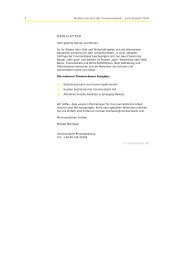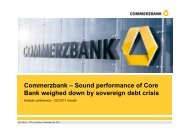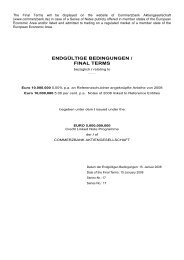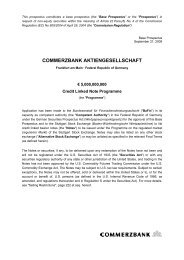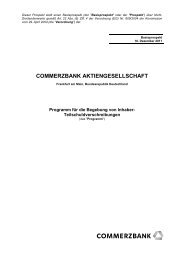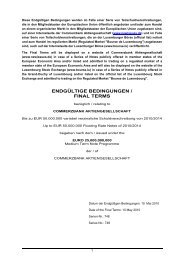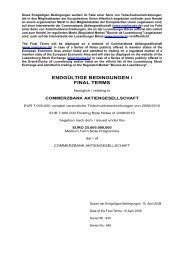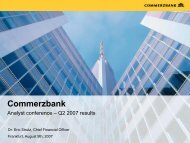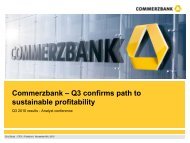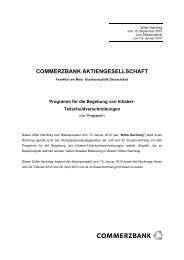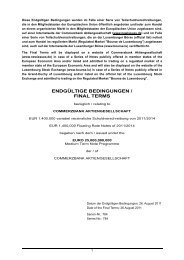COMMERZBANK AKTIENGESELLSCHAFT
COMMERZBANK AKTIENGESELLSCHAFT
COMMERZBANK AKTIENGESELLSCHAFT
You also want an ePaper? Increase the reach of your titles
YUMPU automatically turns print PDFs into web optimized ePapers that Google loves.
To our Shareholders Corporate Responsibility Management Report Risk Report Group Financial Statements Further Information 215 271<br />
258 202 Statement of comprehensive income<br />
260 204 Balance sheet<br />
262 206 Statement of changes in equity<br />
264 208 Cash flow statement<br />
266 210 Notes<br />
409 353 Auditors’ report<br />
(4) Principles of consolidation<br />
Subsidiaries are companies in which Commerzbank<br />
Aktiengesellschaft directly or indirectly holds the majority of the<br />
voting rights or where it has power to determine their financial<br />
and operating policies in another way and thus exercise control<br />
over them so as to obtain benefits from their activities.<br />
Consolidation takes effect from the date on which the Group<br />
acquires the majority of the voting rights or gains control over<br />
the company concerned.<br />
For the consolidation of capital, we remeasure the assets and<br />
liabilities of subsidiaries completely every year, regardless of the<br />
percentage share of equity at the time of acquisition. The assets<br />
and liabilities remeasured at fair value are included in the<br />
consolidated balance sheet net of deferred taxes; identified<br />
hidden reserves and liabilities are accounted for in accordance<br />
with the applicable standards in subsequent reporting periods.<br />
Any difference over net assets on remeasurement is recognised<br />
as goodwill.<br />
Associated companies are entities over which Commerzbank<br />
Aktiengesellschaft has a significant direct or indirect influence.<br />
A significant influence is assumed to exist where the share of<br />
voting rights is between 20% and 50%. Additional criteria for<br />
judging whether there is significant influence include substantial<br />
business transactions with the entity in question, membership of<br />
a management or supervisory board, or involvement in setting<br />
the entity’s business policies.<br />
Jointly controlled entities are companies over which we<br />
exercise joint control together with another company. Joint<br />
control may arise as a result of each company holding equal<br />
voting rights or based on contractual agreements.<br />
Associated companies and jointly controlled entities are<br />
ordinarily accounted for using the equity method and are<br />
reported in the balance sheet under holdings in companies<br />
accounted for using the equity method.<br />
The acquisition cost of these investments including any<br />
goodwill contained therein is determined at the time of their<br />
initial consolidation, applying by analogy the same rules as for<br />
subsidiaries. For material associated companies and jointly<br />
controlled entities appropriate adjustments are made to the<br />
carrying value in the accounts.<br />
Holdings in subsidiaries not consolidated for reasons of<br />
immateriality and holdings in associated companies and jointly<br />
controlled entities which, because of their immateriality, are not<br />
accounted for using the equity method are shown under<br />
financial investments at their fair value or, if this cannot be<br />
reliably established, at cost.<br />
Subsidiaries are deconsolidated as of the date on which the<br />
Bank loses its control over them. Equity accounting for holdings<br />
in associated companies ends on the date that the share of<br />
voting rights falls below 20% or other possibilities of exercising<br />
significant influence over the associated company cease to<br />
apply. Equity accounting for joint ventures ends on the date the<br />
joint management of the venture comes to an end.<br />
The obligation to consolidate special purpose entities under<br />
certain circumstances derives from SIC 12. This stipulates that<br />
consolidation is required if the special purpose entity is<br />
controlled by the parent company. This may be the case if, in<br />
substance,<br />
• the activities of the special purpose entity are conducted on<br />
behalf of the entity according to its specific business needs<br />
so that the entity obtains benefits from the operations of the<br />
special purpose entity;<br />
• the entity has the decision-making powers to obtain the<br />
majority of the benefits of the activities of the special purpose<br />
entity or, by setting up an autopilot mechanism, the entity<br />
had delegated these decision-making powers;<br />
• the entity has rights to obtain the majority of the benefits of<br />
the special purpose entity and therefore may be exposed to<br />
risks incident to the activities of the special purpose entity;<br />
• the entity retains the majority of the residual or ownership<br />
risks related to the special purpose entity or its assets in<br />
order to obtain benefits from its activities.<br />
In the Commerzbank Group the obligation to consolidate special<br />
purpose entities is examined by means of a process that<br />
includes transactions where we form a special purpose entity<br />
with or without the involvement of third parties, and transactions<br />
in which we enter into contractual relations with an already<br />
existing special purpose entity. The decision to consolidate is<br />
regularly reviewed by us. All consolidated special purpose<br />
entities and special purpose entities that have not been<br />
consolidated for materiality reasons are listed in Note 106.<br />
Group Financial Statements



